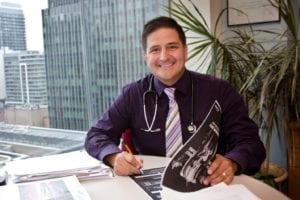
Associate Professor of Pediatrics and Molecular Genetics, University of Toronto and The Hospital for Sick Children
Dr. Mendoza has a long-standing interest in the genetics of skeletal dysplasias, inherited bone disorders and connective tissue disorders, and also serves as Interim Division Head of Clinical and Metabolic Genetics at the University.
ASHG: What academic or extracurricular activities were you involved in that made you stand out among your peers?
Dr. Mendoza-Londono: It is important to be an active member of educational organizations and participate in committees and leadership to increase your visibility and awareness of opportunities that may not be obvious or accessible to all.
Early on, I served on the student council and could attend sessions with invited professors, sit on recruitment panels, and vote on decisions that affected students directly.
Participate in at least one research project at any given time. This increases your hands-on experience and the chance of getting early publications and of presenting at meetings. You never know when a future mentor may show up at your poster or talk and open the doors to new opportunities.
It’s not about competition – rather, try to shine with your own passion for the topic you are interested in. Passion and drive attract opportunities.
ASHG: What advice would you give your former trainee-self?
Dr. Mendoza-Londono: Write grants and apply for funding. As an international student, I wasn’t eligible for many grants and relied too much on the funding that was available to my PI and lab. It is crucial to gain practice in securing funding and requires mentorship and guidance.
Don’t be afraid to fail.
Look for opportunities from industry, foundations and governmental agencies.
Get recognized. Apply for awards. Ask your mentors, teachers or colleagues to consider you for one.
ASHG: What are your favorite and least favorite parts of your job?
Dr. Mendoza-Londono: Upside: I get to influence the development of the field of genetics in the hospital and the University. I like sitting with trainees and colleagues to hear their perspectives and about the things they like or dislike. I like building a vision for the future together.
Downside: The number of meetings I have to attend. Leadership is about communication and building consensus, and that is much better done in person and eye to eye. Meetings are important but take away time from clinical and research activities.
Want more interviews? Join the ASHG Trainee Forum to keep up with new ones!
